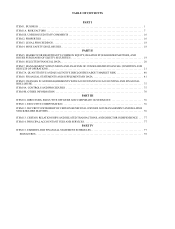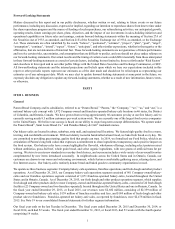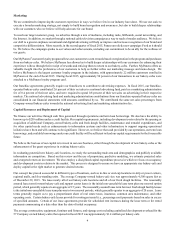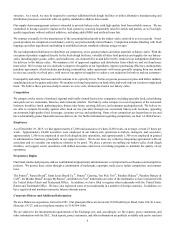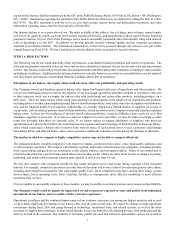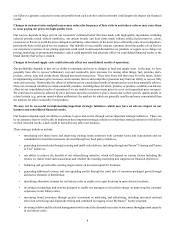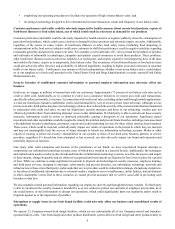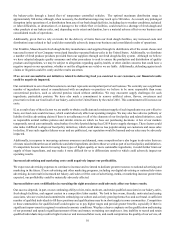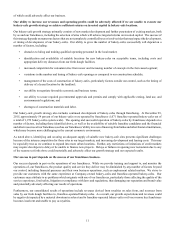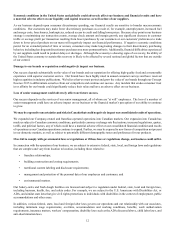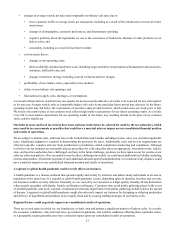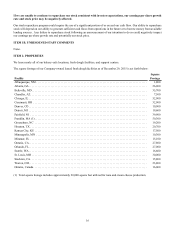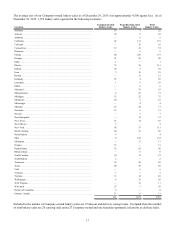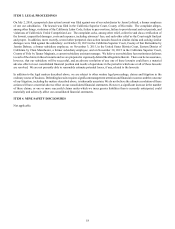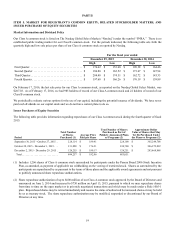Panera Bread 2015 Annual Report Download - page 20
Download and view the complete annual report
Please find page 20 of the 2015 Panera Bread annual report below. You can navigate through the pages in the report by either clicking on the pages listed below, or by using the keyword search tool below to find specific information within the annual report.10
the bakery-cafes through a leased fleet of temperature controlled vehicles. The optimal maximum distribution range is
approximately 300 miles; although, when necessary, the distribution range may reach up to 500 miles. As a result, any prolonged
disruption in the operations of, or distribution from any of our fresh dough facilities, including due to weather conditions, technical
or labor difficulties, or destruction of, or damage to the vehicle fleet or facilities, could result in a shortage of fresh dough and
other products at our bakery-cafes, and, depending on its extent and duration, have a material adverse effect on our business and
consolidated results of operations.
Additionally, given that we rely on trucks for the delivery of items from our fresh dough facilities, any increased costs and
distribution issues related to fuel could also materially adversely impact our business and consolidated results of operations.
Our Franklin, Massachusetts fresh dough facility manufactures and supplies through its distributors all of the cream cheese and
tuna used in most of our Company-owned and franchise-operated bakery-cafes in the United States. Additionally, we distribute
a number of fresh produce products provided from our suppliers through our fresh dough facility system. Although we believe
we have adopted adequate quality assurance and other procedures to seek to ensure the production and distribution of quality
products and ingredients, we may be subject to allegations regarding quality, health, or other similar concerns that could have a
negative impact on our operations, whether or not the allegations are valid or we are liable. Additionally, defending against such
claims or litigation could be costly and the results uncertain.
If we are not successful in our initiatives related to delivering food you can trust to our customers, our financial results
could be negatively impacted.
Our commitment to serve food that customers can trust represents an important part of our business. We currently use a significant
number of ingredients raised or manufactured with an emphasis on practices we believe to be more responsible than some
conventional practices, such as selected proteins raised without antibiotics. We may encounter supply challenges for such
ingredients, particularly proteins. We have also made a commitment to remove artificial colors, flavors, sweeteners and
preservatives from our food in all of our bakery-cafes in the United States by the end of 2016. This commitment will increase our
costs.
If, as a result of any of these factors we are unable to obtain a sufficient and consistent supply of such ingredients on a cost-effective
basis, our food costs could increase, which could adversely affect our operating margins. We may also face adverse publicity or
liability for false advertising claims if there is not adherence to all of the elements of our food policy and related initiatives, such
as responsible animal welfare policies and similar criteria on which we base our purchasing decisions. A few of our markets
temporarily served conventionally raised turkey for a brief period during fiscal 2014 due to supply shortages. These factors could
also make it difficult to align our food policy initiatives, which could make us less popular among our customers and cause sales
to decline. If any such supplier failures occur and are publicized, our reputation would be harmed and our sales may be adversely
impacted.
Additionally, in response to increasing customer awareness and demand, some competitors have also begun to advertise their use
of meats raised without the use of antibiotics and other ingredients similar to those we seek as part of our food policy and initiatives.
If competitors become known for using these types of higher-quality or more sustainable ingredients, it could further limit our
supply of these ingredients, and may make it more difficult for us to differentiate ourselves which could adversely impact our
operating results.
Increased advertising and marketing costs could negatively impact our profitability.
We expect our advertising expenses to continue to increase and we intend to dedicate greater resources to national advertising and
marketing in the future. If new advertising and other marketing programs, including our digital advertising or national television
advertising, do not result in increased net bakery-cafe sales or if the costs of advertising, media, or marketing increase greater than
expected, our profitability could be materially adversely affected.
Increased labor costs or difficulties in recruiting the right associates could adversely affect our future results.
Our success depends, in part, on our continuing ability to hire, train, motivate, and retain qualified associates in our bakery-cafes,
fresh dough facilities, and support centers in a competitive labor market. We look to hire warm, friendly, motivated and caring
associates, who are excited and committed to embodying our culture and actively growing themselves and our brand. A sufficient
number of qualified individuals to fill these positions and qualifications may be in short supply in some communities. Competition
in these communities for qualified staff could require us to pay higher wages and provide greater benefits, especially if there is
significant improvement in regional or national economic conditions. We place a heavy emphasis on the qualification and training
of our personnel and spend a significant amount of time and money on training our employees. Any inability to recruit and retain
qualified individuals may result in higher turnover and increased labor costs, and could compromise the quality of our service, all


